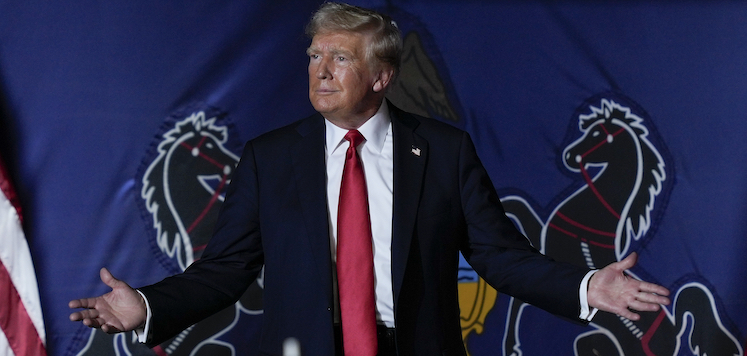Trump Learns the Perils of a One-Man Party
Seth Mandel for Commentary.org
If only Will Rogers could see them now.
This summer’s political dramas would surprise no one more than the man who famously said, nearly a century ago, “I do not belong to an organized political party. I am a Democrat.” The political reality now is quite the opposite.
In 2020, when Bernie Sanders led the race for the Democratic presidential nomination, the party quickly mobilized to have the other candidates drop out before the bulk of the primaries and get their states’ delegates in the hands of Joe Biden.
Four years after that, karma came to collect: Biden had won his party’s nominating contests, but was in such poor polling shape after his disastrous debate with Donald Trump that party elders simply took the crown off his head and put it on Kamala Harris, who has pretty much erased Biden’s polling deficit in a mere two weeks.
Moral of the story: For the Democrats, the party still decides. Not so the Republicans.
It’s not that no one in the GOP disagrees with Donald Trump on policy or other matters. But Trump and the party move as one. Trump is the Republican establishment now, and its institutions follow his lead.
This is not always a negative for the party’s electoral fortunes—he did win in 2016, after all. But there’s no mechanism for self-correction when things are going wrong.
And things are going wrong for Trump right now. Was the Biden-Harris switcharoo counter-democratic? Sure. It was also nimble. We tend to think of bureaucracies as aloof and slow moving. And usually they are. But in this case, the irony is that the election turnaround doesn’t happen without the machine.
If Trump wants to make halftime adjustments, they’ll have to come from him—whatever those adjustments are.
Take Trump’s apparent buyer’s remorse over picking Ohio Sen. JD Vance as his running mate. Vance’s struggles are surprising if only because he has almost never been bad at anything in his life. He is, as John Podhoretz wrote upon Vance’s selection, “the most successful and important American under the age of 40, having lived a triumphant cultural and political life without any clear parallel in modern American history.”
The price of that success was unbridled ambition and what became a chameleonic politics. This is normal for a presidential nominee—Harris and Trump are as ideologically flexible as one can be, and that is not a coincidence. But it’s less than ideal for a vice presidential nominee of Vance’s provocative ideological style because the running mate is never supposed to be the story after the day of their announcement.
No doubt Vance was prepared to have to answer for his flip-flops and his justifications for joining Team Trump. But Trump was not prepared to have to field questions about Vance’s past statements, like his taunting of “childless cat ladies.” (Perhaps he should have been, but he wasn’t.) And it’s clearly getting to him.
Most of the reactions to Trump’s appearance at yesterday’s National Association of Black Journalists gathering have focused on his questioning of Kamala Harris’s race (or what he claims is her cynical embrace of it). But to my ears, his answer to a question about JD Vancewas an alarm bell.
Harris Faulkner asked Trump if Vance will be ready on Day One, should he have to take over as president. Trump seemed to answer a slightly different question, as if he had something to get off his chest and the question was close enough: “I’ve always had great respect for him. And for the other (vice presidential) candidates too. But I will say this—and I think this is well documented—historically the vice president, in terms of the election, does not have any impact. I mean, virtually no impact.”
He then repeated this point in various ways for 30 seconds, declaring (accurately): “If you like me, I’m going to win. If you don’t like me, I’m not going win.” He said that’s the case even if “you have a vice president who’s outstanding in every way, and I think JD is, I think that all of them would have been.”
He’s right on the general point, of course. And Trump in particular is such a lightning rod that it’s hard to imagine his running mate being dealbreaker for many voters. But what about Vance’s effect on Trump? Trump is clearly trying to talk himself out of the idea that he made a mistake.
A real party machine would have been able to see this coming. It would have vetted the candidates according to a “first, do no harm” principle. And even if Trump insisted on Vance anyway, that vetting would have anticipated the problems, strategized ways to get out in front of them, and would have ensured that under no circumstances would Vance go on conservative shows—days into the controversy—to defend his statements.
The theme of Trump’s campaign this year is that he is the party. But sometimes a one-man party can have a harder time turning things around than a bloated old machine.
I do not have issues with Vance; however, he may not have been the best choice.
